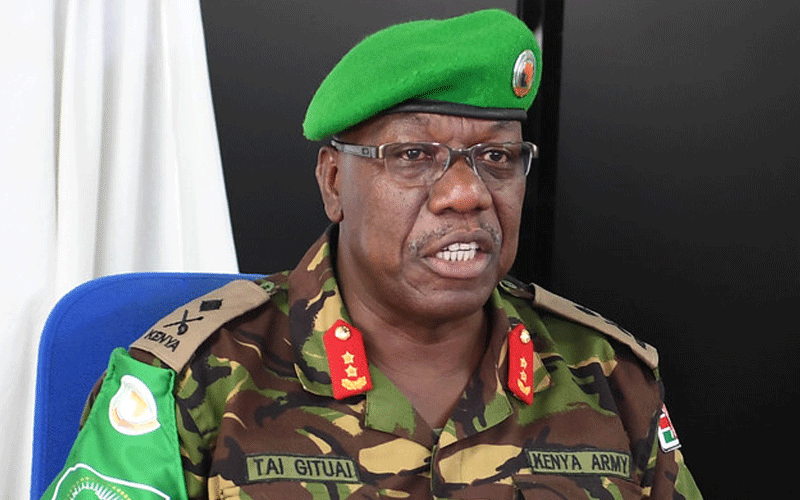Why President Uhuru picks defence college graduates
By Mukalo Kwayera, May 19, 2020Mukalo Kwayera @kwayeram
Last Tuesday’s appointment of Maj-Gen (rtd) Charles Tai Gituai to the diplomatic service in South Sudan was the latest of President Uhuru Kenyatta’s fishing tour at the National Defence College (NDC).
The appointment came hot on the heels of that of Maj-Gen Mohammed Badi to head the Nairobi Metropolitan Services (NMS).
Gituai, a graduate of NDC and former Defence Advisor at Kenya’s embassy in India was on May 12 named as the interim chairperson of the Reconstructed Joint Monitoring and Evaluation Commission (R-JMEC), an initiative of the Inter-Governmental Authority on Development (Igad) to oversee the peace process in South Sudan. He took over from Lt-Gen (Rtd) Ambassador Augustino Njoroge.
Njoroge had served in the position since 2018 when he took over from former President of Botswana, Festus Mogae who he had deputised for two years.
On the other hand, airman Badi, a senior directing staff at NDC, was on March 18 named by the President as the NMS director-general following the now controversial handover by Nairobi Governor Mike Sonko of key departments of the county to the national government.
Before his elevation to the NDC portfolio, Badi was the Moi Air Base Commander.
Hidden in Karen suburb on the outskirts of Nairobi, NDC is the premier regional training institution offering courses in strategic leadership and national security.
It offers courses in diplomacy, public policy, research and public affairs with a special emphasis on dignity and morality, which makes it attractive hub for developing required knowledge bank for senior public officials on national security across government departments and the region.
Besides Gituai and Badi, the latest top-notch officials to be hooked by Uhuru from NDC to head State agencies outside the military, other notable figures to have been tapped from the college, include Lt-Gen Leonard Ngodi, the current the AU-UN Hybrid commander in the strife-torn region of Darfur, Sudan.
Others are Lt-Gen Jackson Waweru, who the President replaced last Friday with former Controller of Budget Agnes Odhiambo as chairman of the National Transport and Safety Authority (NTSA), Kenya Wildlife Service (KWS) director-general, Brig (Rtd) John Waweru who was the Senior Directing Staff, Navy, at NDC prior to his posting, Kenya’s ambassador to Saudi Arabia Rateng’ Odinga Ogega, who was by the time of his deployment early last year the Deputy Commandant (Civilian) at NDC.
According to Egerton University counselling psychology lecturer Owen Ngumi, training at the college focuses on top-level strategic preparedness and response to national security challenges as well as enhancing the capacity of top national security managers in leadership, decision making, risk assessment and communication in crisis, among other key areas.
Decision making
Dr Ngumi, who also teaches at NDC, told People Daily: “The decision making training is particularly aimed at equipping the participants with knowledge and skills in making top-level decisions.
It is tailored towards enhancing the participant’s cognitive abilities as well as intuitive capacities to handle National Security crises, make prompt and sound assessments of situations, formulate actionable decisions aimed at stopping or forestalling public panic and provide guidance on actions necessary for citizens’ protection.”
Educational psychology lecturer at Kenyatta University Chrispus Wawire, says Uhuru’s taste for public servants with roots at NDC is informed by the integrity and work ethic of the graduates from the college.
Dr Wawire, who is also lecturer at NDC says the institution prepares learners to be strategic leaders in their areas of jurisdiction and serve as effective advisers to the senior leadership of the country.
“This means that the graduates are part of the system that determines and reaffirms the values and the security interests of the Nation.
The course equips graduates with expertise in the development of plans and the employment of decisions that are ethical, legal and timely in the execution of our national policies. They are trained to think on their feet,” he adds.
Among the students of the college to hold high-ranking government positions are immediate former Chief of Defence Forces (CDF) General Samson Mwathethe, who retired last week; current Commandant and founding chair of its alumni Lt-Gen Adan Kanchoro Mulata; Director-General of the National Intelligence Service (NIS) Maj-Gen (Rtd) Philip Kameru; Principal Secretary for Public Works Maj-Gen (Rtd) Gordon Kihalangwa; Director-General for Immigration Alexander Muteshi; Government Spokesman Col (Rtd) Cyrus Oguna; Kenya’s ambassador to Malaysia Ndegwa Muhoro, formerly the Director of Criminal Investigations; Kenya’s deputy ambassador to South Korea Joe Ngaira Busiega; and, Deputy DCI Joseph Ashimala.
National Defence College was mooted in 1992. It took off two years later under retired Vice-Chief of General Staff Lt-Gen (rtd) Daniel Opande, who was to transform it into a regional centre of excellence for policy and strategy studies.
Prior to the establishment of the college, top military officers attended the equivalent of NDC courses in the United States, Britain and India.
“This is the leading elite hub for the training of top military officers, foreign affairs and internal security officials.
Since its inception, it has had a major impact on the strategic preparedness of Kenya, regional states and the African continent.
Indeed, currently many of the decision makers in Kenya and several African States have passed through NDC,” says Ngumi.
And Dr Wawire concurs saying: “The major problem in leadership (on the African continent) has been strategic decision-making that focuses on improving people’s living standards.
NDC incorporates in its curriculum lessons relating to the theory and practice of strategy formulation, implementation and evaluation.
These inculcate in the graduates an appreciation of the challenges of strategic decision making.”
